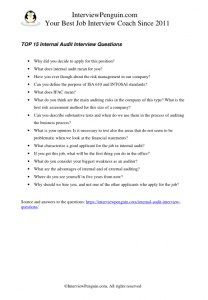Internal auditor is one of the most rewarding roles you can have in any company. It pays well (even when we speak about entry level roles), and you will learn the ins and outs of business process working as an auditor. It will open you doors to many other fascinating careers.
Though you typically won’t compete with many for the job, you can be sure that everyone invited will try their best to succeed, and sign a coveted job contract at the end of the interviews. But just one person will achieve the goal. Will it be you?
The typical interview process for this position consists of screening interview (an easy part), behavioral interview (a difficult part), personality test (optional but common in big corporations), and technical questions that are specific for audit (can be both easy and difficult, depending on your knowledge of the field, and the person who leads an interview with you).
Obviously you can be invited for several rounds of interview (which is the case with auditing giants like KPMG and Deloitte), but you can also deal with all questions in one longer session, which is the case with smaller companies. The selection below should help you to understand what to expect, in terms of interview questions. Enjoy!
Table of Contents
Why do you want to work as an internal auditor?
This is a specific job, and you should come up with a specific answer. If you have any relevant experience—which always helps, do not hesitate to mention it (any experience with auditing, controlling, accounting). You can also say that you read the job description carefully, and believe your strengths match with the working duties.
The most important thing though is enthusiasm in your voice. They shouldn’t feel that you apply just because you can’t get any other job, or because you do not know what to do with your life and degree at the moment, and job of an internal auditor seems a nice addition to your professional resume.
They should feel that you honestly want to work as an auditor, and have a good reason for your choice. It is always good to emphasize that you understand the importance of continuous audit in a business, and see a meaningful purpose in your work. That will convince them about your motivation.
Sample answer:
First and foremost, I understand the crucial role an auditor plays in each business, the responsibility they carry on their shoulders, the impact their work can have on other people in the company. I want to make a difference with my job, and I see the meaningful purpose in this one. Secondly, I believe that my education and experience makes me a good candidate for the position in your company, that I will actually make some difference.
How do you imagine a typical day in work of an internal auditor (here at KPMG/Deloitte)?
The key is to show a proactive approach to work. Obviously, the scope of your duties can vary a lot, depending on your place of work. You may travel to clients (when working for one of big 4 companies and doing most of your work at clients’ workplaces), in other case you may spend a lot of time in one office.
As a sole auditor in a company (or in certain department of it) you may devote a significant portion of your time providing advice to managers. When working in a team, however, this can be someone else’s responsibility… Do not forget to read the job description carefully—sometime you can find your answer there. More often than not, however, the job description is rather blur, and doesn’t show a clear picture of your new job. At the end of the day, job description is also a marketing tool, a way how to attract interesting and smart people like you to apply for the job offer :). In any case, try to show the hiring managers that you like to be busy and take initiative.
Sample answer:
I imagine having my hands full almost each day. This is a big organization with a huge variety of transactions going on each day, with a complicated and fascinating business process—or at least that’s my first impression.
I do not know exactly what my duties will be, what I will respond for as a member of auditing team, since you aren’t entire clear about it on your job description. However, I imagine traveling to different sites to meet staff and obtain documents and information, and later analyze them, report on my findings, and devise some ad hoc advice for the managers and other staff members.
This is how I imagine my daily work, based on the things I know about your company and my idea about the job. Am I right?
What do you consider the main auditing risks in the company of this type?
This is a tricky question and you should not fall in the trap. We know three main auditing risks—inherent, detection, and control. All of them are present in each and every company.
Ensure the interviewers that you are aware of all risks and will keep them on your mind while working as an auditor in their company.
If you had a job in a similar institution before, you can pick one of the auditing risks, saying that certain factors contribute to that particular risk. But do this only if you are 100% sure about the accuracy of your answer.
Sample answer:
In my opinion, we can’t pinpoint a particular risk in any company. We have to keep inherent, detection and control risk in check, and risk factors that contribute to each one of them. For example, even the best employee can make a mistake and report wrong numbers (if they don’t do it on purpose, of course), and that’s why proper internal control over financial reporting is essential in each company. In a company of this size it can take quite a lot of time, but if we have proper mechanisms in place, including punitive measures, we should manage to minimize the risk.
What does internal audit mean for you?
To conduct internal audit means to help an organization accomplish its objectives by bringing a systematic, disciplined approach to evaluate and improve the effectiveness of risk management, control and governance processes (official definition by the institute of internal auditors).
Of course, you do not have to stick to any official definitions, and can approach the question from a different angle. For example what it means for your career, for you personally, how do you see the field as a whole, etc. It really is your choice.
Sample answer:
More than anything else, internal audit is my passion. It is something I want to dedicate my professional career to, and that’s not a small decision to say the least. But it also means a big responsibility to me, since I realize how costly any mistake in this job can prove…
What is your opinion on cooperating with external auditors?
Risk assessment is a complex and sensitive issue. It would be foolish to rely on a single professional to take care of it, be it the most skilled and experienced person in the entire company (which isn’t typically the case anyway). Anytime they ask you about cooperation with external professionals (auditors, lawyers, counselors), embrace the opportunity.
You can even speak about such experience from the past, and you can clearly define the advantages of cooperating with someone from outside of the company (they have a different perspective, perhaps experience with similar business process in companies with similar structure, etc).
Sample answer:
I consider it necessary. We need more pairs of eyes, and external auditors and consultants can look at the company from the outside. They can spot things and issues we fail to spot, simply because we can’t see them from our position. I try to stay humble, and I am aware that I can make a mistake. Having someone else to audit our business process, or at least review our audit, can only help the company in a long run.
What does IFAC mean?
This question is another example of how important it is to remain focused during the interview, and calmly listen to the questions of the interviewers.
Say what IFAC means, and that’s it. No need to elaborate on your answer in any way. Similar approach applies to all simple technical questions. If they want you to elaborate on your answer (which typically isn’t the case with simple technical questions), they will ask additional questions. (You can read more about IFAC here: https://en.wikipedia.org/wiki/International_Federation_of_Accountants)
If you get this job, what will be the first thing you do in the office?
Changing your LinkedIn profile, smoking a good cigar in your comfy office, and buying a new car. Or at least calling your friends and sharing the good news, throwing in a big party for the chosen few (or chosen many). Perhaps you’d do that, but they want to hear something else in a job interview.
I suggest you to say that you would eagerly anticipate the orientation, and talks with senior auditors, trying to understand your role in the auditing/accounting department, and what you’ll be responsible for. This is a good answer especially when you apply for an entry level role, or for an auditing job in a company that employs several auditors, or dozens of them.
If you apply in a smaller organization, however (and it doesn’t matter whether for-profit or non-profit, private or public), and will be the only auditor in the organization, say that the first thing you’ll do will be reviewing the results of the last audit—if they made any. If they didn’t (can be the case in new and growing companies), say that the first thing will be understanding the business process in detail (talking to leaders of the company and common employees), and planning the audit schedule accordingly.
Sample answer:
This depends on whether you have ever audited the business process in your company. If you have, I’d review the latest audit, the results and suggested improvements. This should help me understand where we stand right now, and how to plan and conduct the ensuing audits. If you haven’t audited the business process yet, I’d start with analyzing the business process, talking to heads of departments and also common employees, and plan the audit schedule accordingly. That’s likely the first thing I’d do after starting in this job.
What do you consider your biggest weakness as an auditor?
If you are just starting, lack of experience is a good answer. Everyone has to start somewhere, however, and even the best auditors had their first auditing experience, and made some mistakes along the way. They would not consider it a showstopper, and at the same time they will appreciate your honesty.
If you’ve already done auditing, you can point out a specific area of auditing, or a certain skill or ability that needs improvement (perhaps your computer skills, accounting skills, ability to keep professional distance, etc). The key is to ensure them that you plan to work on your skills, and want to improve on any weaknesses that matter for your job.
Sample answer:
I believe that I could improve my analytical skills, and also on my communication skills, especially when talking to people from lower echelons of the company. I have to learn to deliver my message without adding unnecessary professional jargon, simply to say things in a way that people understand me. I am aware of my weaknesses, and hope that I will eventually get rid of them.
Other questions you may face in your internal auditor job interview
- Where do you see yourself in five years from now?
- Describe a conflict you had with your colleague.
- Why KPMG (Deloitte, other big name)?
- Do you have any experience with software solutions for internal audit?
- Why do you want to work for us, and not one of our competitors (another company)
- Have you ever detected a case of fraud? What process did you follow?
- How do you ensure to keep your knowledge of laws and regulations up to date?
- Describe a time when you struggled with motivation in job.
- Imagine a situation where you have to deal with uncooperative colleagues. What will you do?
- Have you ever had difficulty persuading others to implement your recommendations? What did you do to push forward with your ideas?
- Describe the biggest failure of your professional career.
- …
Conclusion, brilliant sample answers to all questions
Interview for any job in internal audit belongs to difficult job interviews. Hiring managers will test your motivation, skills, attitude, and also knowledge with a healthy mix of personal, behavioral, and technical questions.
If you are not sure how to answer the questions, or experience anxiety, have a look at the eBook I wrote for you, the Internal Audit Interview Guide. Multiple brilliant answers to 25 most common internal audit interview questions will help you get rid of stress, streamline your interview preparation, and prepare for every challenge you may face in this interview. Thank you for checking it out, and I wish you good luck!
Matthew Chulaw, your personal job interview coach
* You can also download the list of questions in a one-page long .PDF document, and practice your interview answers anytime later, even when offline:
May also interest you:
- Work portfolio in an interview – Learn how to prepare a selection of your best works, and how to use it to show the interviewers the value you can bring to their team.
- Interview attire special tips – Some interview attire tips for the brave, and for people who like to experiment.
- Salary negotiation tips – Basic rules you should remember when negotiating a salary in your interview.
- How to answer interview questions – It is not only about what you say, but also how you say it in an interview….



